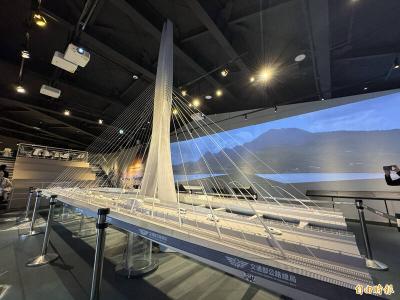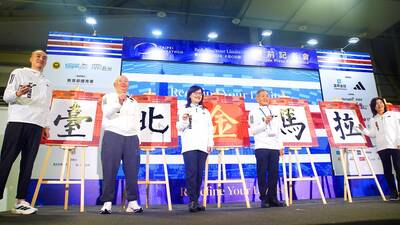The Sports Affairs Council (SAC) yesterday gave the Kaohsiung City Government two weeks to submit more information on how it plans to spend state-allocated funds for July’s World Games.
The council rejected the city’s proposed budget last week, accusing the city of inflating costs.
Council Deputy Minister Chen Hsien-chung (陳顯宗) said that the city government proposed spending NT$1.53 billion (US$44 million) to prepare for the Games. The city suggested the central government stump up approximately NT$943 million, with the city and the Kaohsiung Organizing Committee (KOC) raising the rest.
Chen said the council had reviewed the city’s budget plan and only approved spending of around NT$175 million.
“The city did not specify exactly what it plans to do in six of the listed projects,” he said. “We asked it to provide supplementary information by March 15.”
Chen criticized the KOC for making remarks to the press, saying this increased tension between the central and local government.
He said regulations governing the appropriation of central government subsidies to local governments have indicated that public construction and event expenses must be shared equally between the two, meaning the Kaohsiung City Government must raise half the money itself. The budget plan the city submitted last month, however, did not follow regulations, Chen said.
As examples of wastefulness, Chen said the city hosted a warm-up event for the World Games in November, but had budgeted for another warm-up event this year.
The city also said it planned to spend NT$1 million sending representatives overseas to learn from other international games.
Meanwhile, the city’s budget plan indicated that it would spend around NT$6 million “developing potential audiences for the games,” Chen said. However, the council had already given the city NT$90 million to publicize the games domestically.
Chen said that the council provided Kaohsiung City with NT$207 million for preparatory work in the last fiscal year.
The Deaflympics, to be held in Taipei in September, had only received NT$60 million, he said.

Upon its completion next year, the new Tamkang Bridge (淡江大橋) in New Taipei City is to be an important landmark in Taiwan, alongside Taipei 101, Minister of Transportation and Communications Chen Shi-kai (陳世凱) said today. The bridge is scheduled to be completed in December next year and open to the public in the first half of 2026, connecting New Taipei City’s Tamsui (淡水) and Bali (八里) districts. It is an asymmetric single-tower suspension bridge, nearly 70 stories tall, designed by world-famous architect Zaha Hadid. The bridge aims to alleviate traffic in Tamsui and on the Guandu Bridge (關渡大橋), in addition to increasing the

PUBLIC TRANSPORT: As some roads would be fully or partially closed, people are advised to take the MRT, with services expanded to accommodate more riders This year’s Taipei Marathon, which has obtained its first gold label certification from World Athletics, is to be held from 5am to 1pm tomorrow and would have 28,000 participants. The race is to start from the Taipei City Plaza and would go through major roads throughout the city, with traffic control implemented from 6am to 2pm, officials said. The Taipei Mass Rapid Transit (MRT) system and New Taipei City MRT Circle line would start operating at 5am on the day of the race, they said. The race would cover Renai Road, Xinyi Road, Hangzhou S Road, Aiguo east and west roads,

EXERCISES: A 2022 article by a Chinese intelligence expert identified at least six People’s Liberation Army assault boats hidden inside the Hong Kong-flagged ship A Hong Kong-flagged cargo ship that had been docked at Taichung Port and which previously took part in Chinese military exercises departed from the port on Saturday, the Taiwan International Ports Corp’s Taichung branch said yesterday. The statement came in response to a post on the social media platform X by Taiwan-based journalist Chris Horton that said the ship, the SCSC Fortune, had been docked at the port since Tuesday and questioned whether Taiwan has any rules regarding foreign civilian vessels that have participated in People’s Liberation Army (PLA) exercises. Horton referenced a 2022 article by Chinese intelligence expert Rod Lee that

PROBLEMATIC: Popular hotpot restaurant chains were among the list of restaurants that failed the inspection and have been ordered to remove bad ingredients The Taipei Department of Health’s latest inspection of hotpot ingredients in hotpot restaurants resulted in a 16.7 percent failure rate. Eight vegetables had excessive pesticide residue and two other items had aflatoxin and excessive preservatives. As the weather is getting colder, more people eat at hotpot restaurants so a random inspection of ingredients was conducted in October to ensure food safety, the department said. Food and Drug Division Director Lin Kuan-chen (林冠蓁) said 60 different ingredients were tested: 15 high-risk vegetables, 15 processed food items, 10 soy-based food items, five meat items, five lamb items, five seafood items and five peanut powder